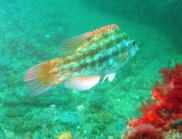WoRMS name details
Symphodus (Crenilabrus) bailloni (Valenciennes in Cuvier & Valenciennes, 1839)
127454 (urn:lsid:marinespecies.org:taxname:127454)
alternative representation
Species
marine, terrestrial
(of Crenilabrus bailloni Valenciennes, 1839) Cuvier, G.; Valenciennes, A. (1839). Histoire naturelle des poissons. Tome treizième. Livre seizième. Des Labroïdes. v. 13, pp i-xix + 1-505 + 1 p., Pls. 369-388. [details]
Distribution It can be that this is species is increasing in abundance and distribution in the eastern English Channel, in association...
Taxonomy This species could previously been mis-identified /confused with S. melops, as suggested by Wheeler & Clark (1984).
Distribution It can be that this is species is increasing in abundance and distribution in the eastern English Channel, in association with the warmer sea temperatures and the regime shift described for the North Sea circa 1988 (Reid et al., 2001). [details]
Taxonomy This species could previously been mis-identified /confused with S. melops, as suggested by Wheeler & Clark (1984).
Taxonomy This species could previously been mis-identified /confused with S. melops, as suggested by Wheeler & Clark (1984). [details]
Froese, R. and D. Pauly. Editors. (2024). FishBase. Symphodus (Crenilabrus) bailloni (Valenciennes in Cuvier & Valenciennes, 1839). Accessed through: World Register of Marine Species at: https://www.marinespecies.org/aphia.php?p=taxdetails&id=127454 on 2024-11-10
Date
action
by
![]() The webpage text is licensed under a Creative Commons Attribution-Noncommercial 4.0 License
The webpage text is licensed under a Creative Commons Attribution-Noncommercial 4.0 License
original description
(of Crenilabrus bailloni Valenciennes, 1839) Cuvier, G.; Valenciennes, A. (1839). Histoire naturelle des poissons. Tome treizième. Livre seizième. Des Labroïdes. v. 13, pp i-xix + 1-505 + 1 p., Pls. 369-388. [details]
basis of record van der Land, J.; Costello, M.J.; Zavodnik, D.; Santos, R.S.; Porteiro, F.M.; Bailly, N.; Eschmeyer, W.N.; Froese, R. (2001). Pisces, <B><I>in</I></B>: Costello, M.J. <i>et al.</i> (Ed.) (2001). <i>European register of marine species: a check-list of the marine species in Europe and a bibliography of guides to their identification. Collection Patrimoines Naturels,</i> 50: pp. 357-374 (look up in IMIS) [details]
additional source Fricke, R., Eschmeyer, W. N. & Van der Laan, R. (eds). (2024). ECoF. Eschmeyer's Catalog of Fishes: Genera, Species, References. <em>California Academy of Sciences. San Francisco.</em> Electronic version accessed dd mmm 2024., available online at http://researcharchive.calacademy.org/research/Ichthyology/catalog/fishcatmain.asp [details]
additional source Cuvier, G.; Valenciennes, A. (1839). Histoire naturelle des poissons. Tome treizième. Livre seizième. Des Labroïdes. v. 13, pp i-xix + 1-505 + 1 p., Pls. 369-388.
page(s): 180 [details]
basis of record van der Land, J.; Costello, M.J.; Zavodnik, D.; Santos, R.S.; Porteiro, F.M.; Bailly, N.; Eschmeyer, W.N.; Froese, R. (2001). Pisces, <B><I>in</I></B>: Costello, M.J. <i>et al.</i> (Ed.) (2001). <i>European register of marine species: a check-list of the marine species in Europe and a bibliography of guides to their identification. Collection Patrimoines Naturels,</i> 50: pp. 357-374 (look up in IMIS) [details]
additional source Fricke, R., Eschmeyer, W. N. & Van der Laan, R. (eds). (2024). ECoF. Eschmeyer's Catalog of Fishes: Genera, Species, References. <em>California Academy of Sciences. San Francisco.</em> Electronic version accessed dd mmm 2024., available online at http://researcharchive.calacademy.org/research/Ichthyology/catalog/fishcatmain.asp [details]
additional source Cuvier, G.; Valenciennes, A. (1839). Histoire naturelle des poissons. Tome treizième. Livre seizième. Des Labroïdes. v. 13, pp i-xix + 1-505 + 1 p., Pls. 369-388.
page(s): 180 [details]
 Present
Present  Present in aphia/obis/gbif/idigbio
Present in aphia/obis/gbif/idigbio  Inaccurate
Inaccurate  Introduced: alien
Introduced: alien  Containing type locality
Containing type locality
Unreviewed
Distribution It can be that this is species is increasing in abundance and distribution in the eastern English Channel, in association with the warmer sea temperatures and the regime shift described for the North Sea circa 1988 (Reid et al., 2001). [details]Taxonomy This species could previously been mis-identified /confused with S. melops, as suggested by Wheeler & Clark (1984). [details]
